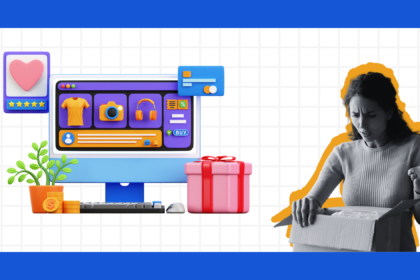A whopping 90% of the customers actively track their packages with over 20% of them tracking multiple times in a day. This shows that despite receiving prompt and regular shipping notifications, customers tracking their own orders on tracking pages really puts ‘smile’ on their faces and delights them.
Thus, the need for eCommerce businesses to provide their customers with tracking pages is clear. However, not just any tracking page would do. Your self-hosted tracking pages need to be of the highest standards to not just meet but exceed customer expectations.
This is where ‘branded’ order tracking pages come in. But before we get to the best efforts required to provide branded order tracking experiences, let’s start by looking at how far eCommerce businesses have been able to keep up with customers’ package tracking expectations.
The Current State of Legacy Order Tracking Methods
Once the order gets shipped, the customer is sent a link that takes them to the carriers’ tracking page where they periodically track their orders as they unfold. However, this process is outdated and simply not the best for your business and brand building.
For more context, The significant downside here is that carrier tracking pages are:
- Off-brand
- Visually boring
- A marketing dead-end (does not encourage any further brand interaction)
Worry not though. There’s a better way to do tracking.
Rather than taking your customers to the carrier’s tracking page, you can direct them to your own tracking page that can help you provide post-purchase experiences that are on-brand and can also be your eCommerce store’s next marketing advantage.
In order to make things work a lot better in your favor, you need to provide ‘branded tracking pages’ that improve brand experience, inspire loyalty, and increase sales. But first what exactly is a branded tracking page?
What is an Ecommerce Branded Tracking Page and How You Can Create One?
A branded order tracking page is a tracking page hosted on your eCommerce website that enables your customers to track their online orders in real-time.
Apart from the usual content of delivery timeline, tracking details, real-time order status updates, etc, a branded tracking page also contains your brand elements such as logo, font, and color schemes to extend the branded experience from the product pages. Also, your branded tracking pages can contain personalized product recommendations and promotions to drive repeat sales.
Thus, it is clear what role branded eCommerce tracking pages play in improving the customer experience during the post-purchase order delivery phase. To help you build great and beautiful-looking order tracking pages, here are some guidelines that you can follow.
Best practices to create an eCommerce order tracking page
Guideline #1 – Provide complete delivery information
- First and foremost, don’t miss out on providing your customers with all the essential information that is usually available on order tracking pages.
- This can include the complete order delivery status in reverse chronological order, expected delivery date, current order status (Shipped / In-transit / Delivered), etc, order information (number / size), and more.
Impact – Reduce Delivery Related Customer Enquiries (WISMO Calls) With Self-Service Order Tracking Pages
Guideline #2 – Replicate brand identity elements from your homepage and product pages
- Make your order tracking pages an extension of the product purchasing journey. Include all the fonts, color schemes, design templates, etc
Impact – Keep customers connected with your brand experience even in the post-purchase, order delivery phase. Brand immersive tracking experiences delight your customers and drive higher ROI.
Guideline #3 – Feature relevant support channels
- Your customers would want to talk to your support team regarding additional information regarding product-related queries, return policy, etc
- In such cases, instead of making the customer search and locate relevant customer support channels, you can enable them to directly reach out from the order tracking page
- For instance, you can provide options for your customers to chat with your support reps, including product usage information, easy returns initiation, etc.
Impact – Reduce customer anxiety by taking the hassle out of support queries via seamless engagement and instill confidence in your customers.
Guideline #4 – Include product recommendations and promotions
- As mentioned, customers track their orders 6-8 times before delivery. This implies that branded order tracking pages are a great way to highlight your upsell and cross-sell your products via personalized promotions and recommendations.
- You can also use your tracking page to offer discounts and include other marketing assets to lead your customer back to your online store.
Impact – When it is made to its fullest use, custom tracking pages can help you leverage order tracking moments to increase repeat sales (by opening upselling and cross-selling opportunities).
Guideline #5 – Get customer feedback around order delivery experiences and take appropriate actions
- Capture your customers’ delivery experience ratings after every order delivery
- Analyze the average ratings of customers to optimize shipping & delivery operations
Impact – Decode customer actions post-purchase and evaluate your carriers’ performances to perfect your post-purchase strategy.
Following these time-tested practices to manually create branded tracking pages on your own is good. But there’s a better way to do this.
You can make use of a delivery experience management solution such as LateShipment.com that helps you effortlessly build custom branded tracking pages on your domain via drag-and-drop options.
Build Branded Ecommerce Tracking Pages with Lateshipment.Com
LateShipment.com’s Delivery Experience Management platform (DEM) platform is chock-a-block filled with benefits for your business to provide an on-brand post-purchase experience. Read on to explore the benefits for merchants and customers alike via branded tracking pages.
Benefits for the merchant
- Control your experiences to be in line with your ecommerce website product pages and tracking pages and prevent them from being disconnected from the brand experience.
- Carrier tracking pages don’t have upselling features while LateShipment.com helps you increase sales with marketing campaigns & product recommendations on tracking assets.
- Engage with the customer via ‘how-tos’ and product guides to reduce unnecessary returns.
- Advertising is the biggest advantage but you can as well include referring a friend and newsletter subscription columns as additional benefits.
- Collect delivery feedback and understand how the delivery experience was for the customer.
Benefits for the customer
- Live package tracking – access to the package at all times.
- One place to access everything about their package – Order details, etc.
- Have an extended shopping experience – seamless purchase and post-purchase experiences.
- Initiate order returns directly from the tracking page.
That’s not all! There are other ways LateShipment.com can help your business in the form of delivery and returns management and automated parcel audit solutions (spoiler alert – helps you save up to 20% on your shipping costs).
But for now, here’s how we can help you start creating branded eCommerce tracking pages.
- Create a LateShipment.com account – Simply create an account with your email id and password to get started with our DEM platform set up.
- Set up real-time shipment tracking – Add your shipment data source (Shipping Carriers, Ecommerce Platform, or Order Management System)
- Get started without any coding hassles – Follow the on-screen instructions to start creating branded tracking experiences on your store.
Bottom Line
For modern ecommerce customers, branded order tracking is no longer a USP but a standard offering.
Missing out on letting your customers track their orders on your tracking pages means missing out on creating a positive post-purchase CX.
With a custom-built branded order tracking page, you can extend your brand experience with customers, post-purchase, and stay on top of your customers’ minds.
You can also use it to increase sales, reduce returns, and most importantly understand how your customers perceive your brand.





